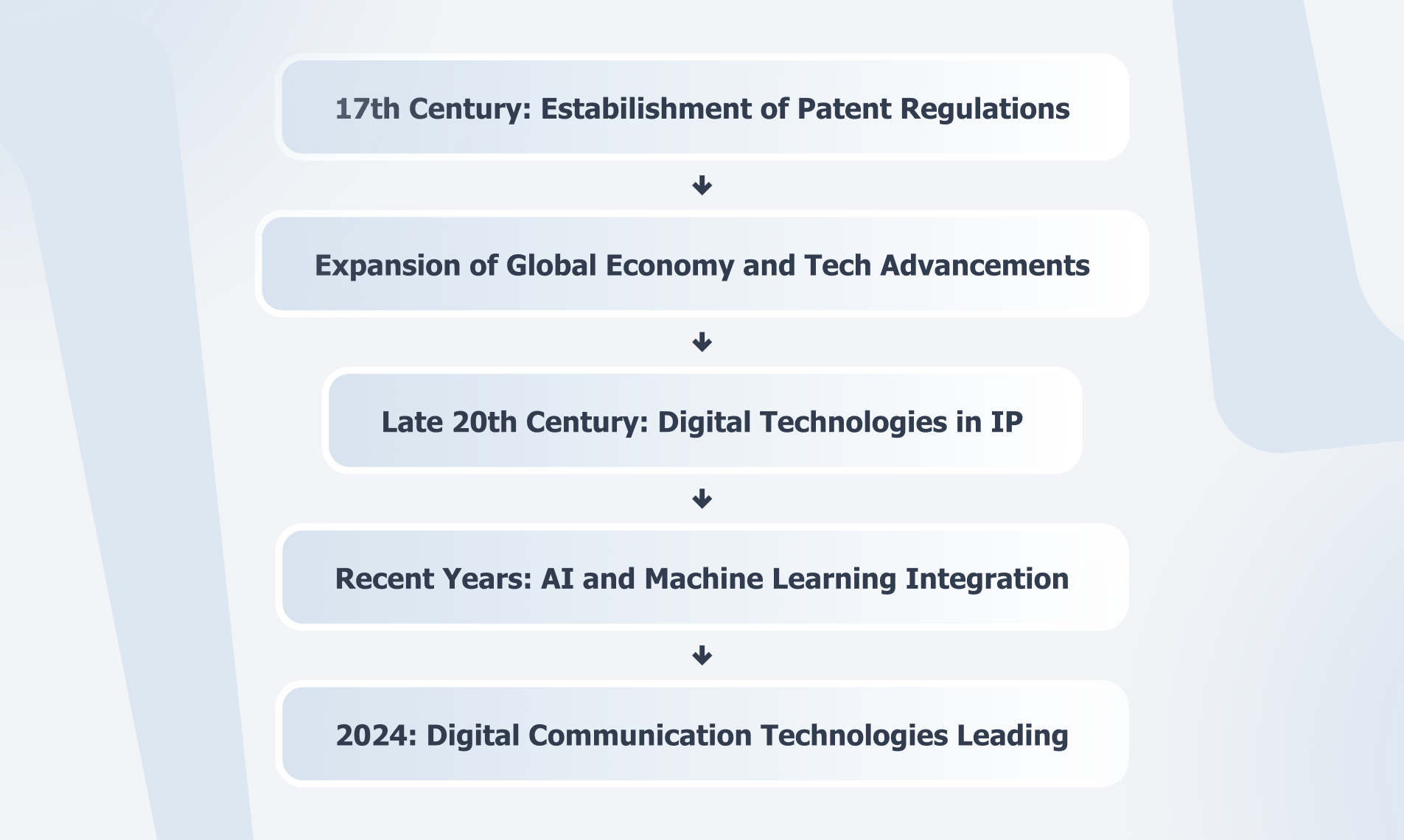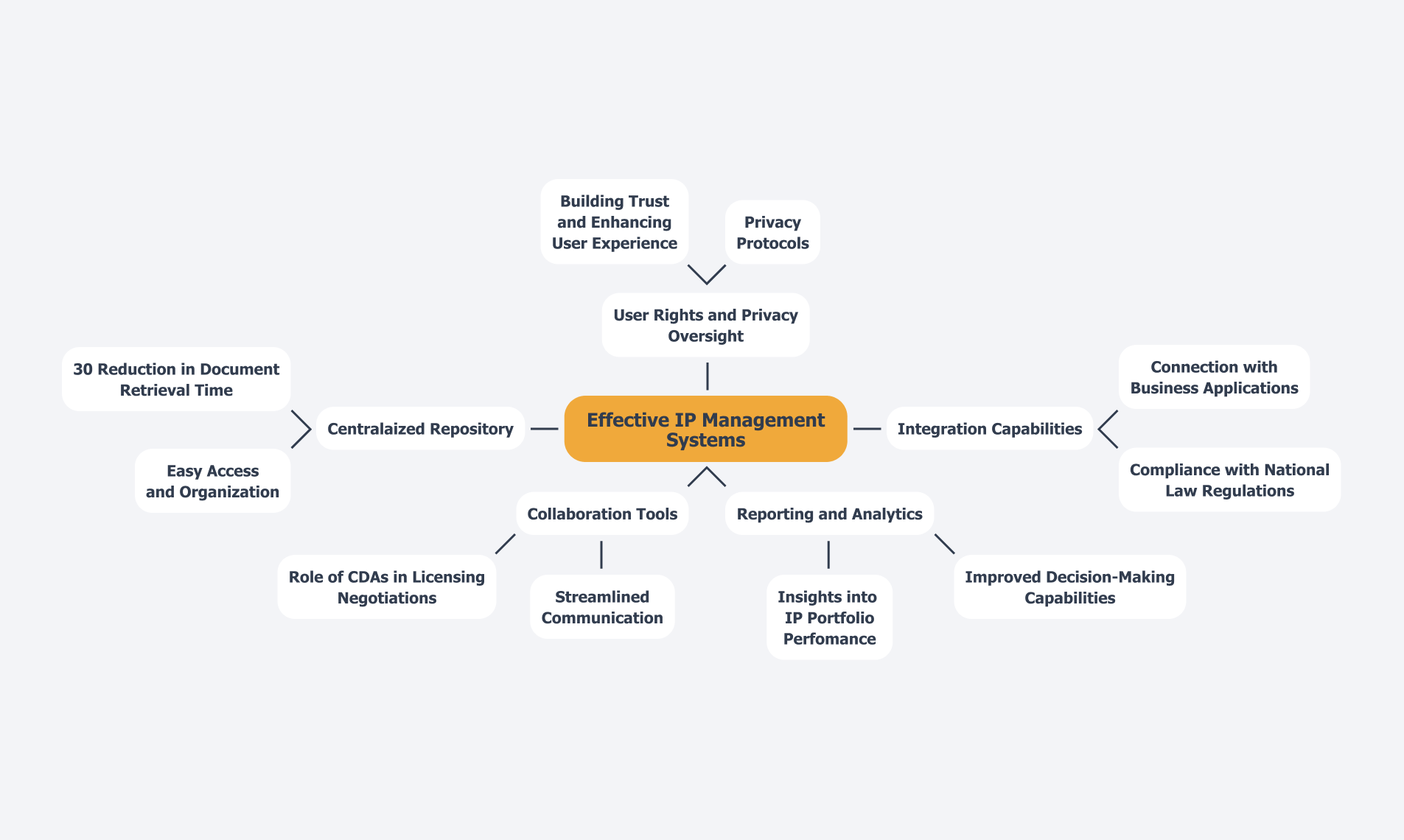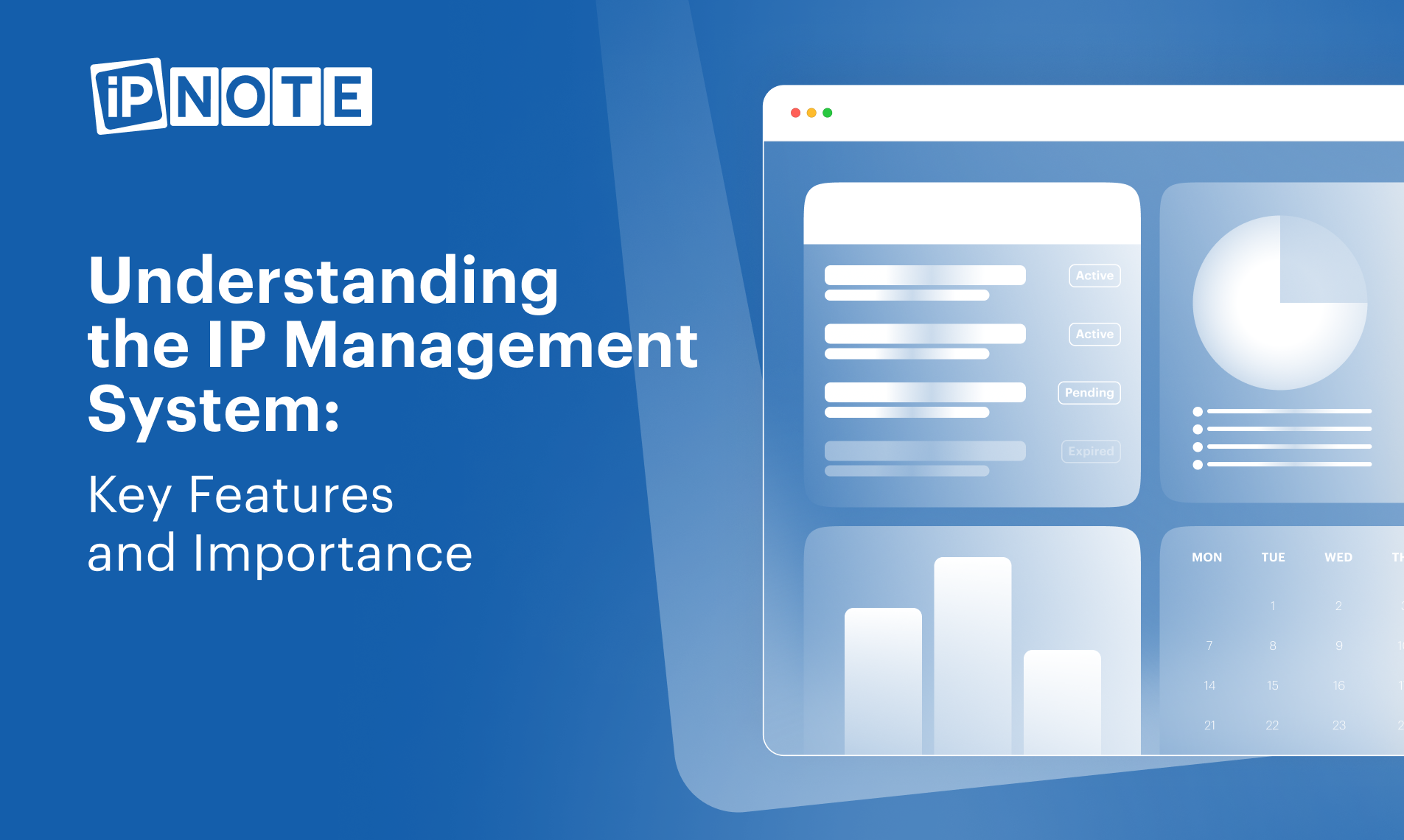Overview
This article delves into the pivotal features and significance of IP management systems, underscoring their critical role in managing a company’s intangible assets, including patents and trademarks. Effective IP management systems are not merely beneficial; they are essential for amplifying business value, ensuring compliance with regulations, and fostering a culture of innovation. The growing adoption of these systems among businesses serves as compelling evidence of their importance, alongside the significant financial ramifications that can arise from intellectual property disputes. As organizations navigate the complexities of IP management, it becomes increasingly clear that a robust system is not just an asset but a necessity for sustainable growth and competitive advantage.
Introduction
In a world where innovation drives competitive advantage, the management of intellectual property (IP) stands as a critical pillar for businesses.
Companies are increasingly recognizing the value of their intangible assets—spanning patents to trademarks—making effective IP management systems essential tools for safeguarding these vital resources.
With technological advancements, particularly the integration of artificial intelligence, organizations can automate key processes, streamline operations, and enhance collaboration, all while ensuring compliance with complex legal frameworks. The growing reliance on such systems, underscored by significant returns experienced by users, highlights the imperative for businesses to adopt robust IP management strategies.
This article delves into the core concepts, historical evolution, and key features of effective IP management systems, illuminating their pivotal role in driving innovation and sustaining business growth in today’s knowledge-driven economy.
Define IP Management System: Core Concepts and Functions
An IP management system serves as a comprehensive framework for overseeing a company’s intangible assets, including patents, trademarks, copyrights, and trade secrets. These systems are vital for tracking the lifecycle of IP assets in an IP management system, ensuring compliance with legal standards, and facilitating strategic utilization that enhances business value.
iPNOTE’s AI-driven platform exemplifies this by automating essential processes such as task creation and reminders, while providing quick access to your IP portfolio. This capability enables organizations to eliminate routine processes and maintain effective oversight, optimizing their IP assets. Automation not only simplifies registration, renewal, and monitoring but also enhances collaboration with internal and external providers, presenting a cost-effective solution for global IP oversight.
Indeed, recent research indicates that over 60% of businesses currently utilize IP oversight solutions, underscoring their growing importance in today’s competitive landscape. This statistic is further supported by a report analyzing the innovative efforts of the top 2000 R&D investors worldwide, emphasizing the critical role of intellectual property oversight in fostering innovation.
The strategic management of an IP management system can significantly impact a company’s market position and profitability, making such systems indispensable for entities aiming to increase the value of their intellectual property. Furthermore, recent initiatives such as the PPH pilot program announced by CNIPA and IPONZ highlight ongoing advancements in the field. This trend underscores the necessity for a robust IP management system that not only streamlines processes but also enhances overall organizational performance.
Contextualize the Importance of IP Management Systems in Business
In the contemporary knowledge-driven economy, intellectual property (IP) is a pivotal asset for businesses, often constituting a significant portion of their overall valuation. Effective IP management systems are crucial for protecting these assets, allowing organizations to navigate intricate legal frameworks, mitigate risks associated with IP infringement, and seize monetization opportunities through licensing and strategic partnerships.
The Apple vs. Samsung lawsuit, which spanned seven years and culminated in Apple being awarded $539 million, underscores the financial stakes involved in IP disputes. As Wilson noted, “Filing for IP protection is also likely to increase the overall value of the firm in question once the associated IP rights are granted.”
Firms exemplifying this trend leverage AI-driven platforms to simplify IP registration processes, resulting in significant cost savings and improved operational efficiency. Notably, one such firm in the USA experienced a remarkable 7x return on investment in the number of deals through effective advertising strategies and clear positioning. Similarly, a company in South Korea reported more than double the profits and international customers due to enhanced SEO optimization and advertising campaigns.
By adopting comprehensive IP oversight systems like iPNOTE, businesses can bolster their innovation capabilities, safeguard their market position, and ultimately drive sustainable growth. Furthermore, trade secrets and unregistered trademarks possess weak protection compared to registered assets, emphasizing the dangers linked to insufficient IP oversight.
Data reveals that 12% of US patent applications in 2019 were in the area of computer technology, highlighting the sector’s dominance and the growing significance of robust IP oversight in promoting innovation and economic growth. This statistic underscores the necessity of effective IP management systems in supporting businesses within this rapidly evolving landscape.
The Prime Ultra plan provided by the company enhances these capabilities by guaranteeing a 3x increase in customer acquisition through tailored marketing strategies, exclusive partner status, and reduced commission structures, making it an invaluable resource for corporate IP managers. Testimonials from satisfied clients further validate the effectiveness of iPNOTE’s services, emphasizing the platform’s reliability and the ease of connecting with potential clients.
Trace the Evolution of IP Management Systems: Historical Perspectives
The development of IP oversight frameworks can be traced back to the 17th century, when patent regulations were first established in England.
As the global economy expanded and technological advancements emerged, the demand for more advanced IP practices grew. The late 20th century marked a pivotal shift with the advent of digital technologies, leading to the creation of specialized software solutions that automated and streamlined the IP management system. This transition not only boosted efficiency but also increased accessibility for businesses maneuvering through complex IP landscapes.
In recent years, the incorporation of artificial intelligence and machine learning into IP oversight systems has further altered the field. Platforms such as this exemplify this advancement, providing extensive AI-powered oversight for patents, products, and research and development. These technologies enable organizations to conduct real-time monitoring of their IP portfolios and utilize predictive analytics, offering insights that were previously unattainable. iPNOTE’s advanced task coordination features allow users to set tasks, track progress, and handle provider interactions seamlessly, ensuring that all stakeholders are aligned and informed. The platform is designed to be dummy-proof, keeping users’ portfolios organized and secure.
For instance, in 2024, digital communication technologies emerged as the leading industry for international patent applications, underscoring the critical role of technology in driving innovation and shaping modern business practices. As per WIPO, global patent applications submitted via the Patent Cooperation Treaty rose by 0.9% in 2021, totaling 277,500 applications, indicating the growing need for advanced IP handling methods over time. Moreover, the increasing use of digital solutions in the IP management system, along with robust regulatory backing, is anticipated to drive ongoing expansion in the area, as indicated by Straits Research. As the landscape continues to change, the incorporation of advancements such as streamlined role-based access control and task delegation in platforms like iPNOTE is expected to drive further innovations in IP oversight.

Identify Key Features of Effective IP Management Systems
Effective IP oversight frameworks are characterized by several essential features that significantly enhance their functionality and usability.
- Automated Tracking: These frameworks automatically monitor deadlines for renewals, filings, and compliance requirements, thereby minimizing the risk of costly oversights. The automation of tracking licensing agreements and royalty payments proves particularly beneficial in manufacturing, streamlining processes and ensuring timely actions.
- Centralized Repository: A unified platform for storing all IP-related documents and data guarantees easy access and organization. Centralized repositories not only improve efficiency but also enhance security and compliance. Statistics indicate that organizations utilizing centralized repositories experience a 30% reduction in time spent on document retrieval, as evidenced by case studies where universities effectively manage large volumes of IP data, aiding them in developing IP strategies and facilitating secure recordkeeping.
- Reporting and Analytics: Advanced reporting tools provide insights into IP portfolio performance, empowering organizations to make informed strategic decisions. Statistics reveal that companies utilizing these analytics enjoy improved decision-making capabilities and enhanced portfolio management.
- Collaboration Tools: Features that facilitate collaboration among teams and external partners are crucial for managing complex IP portfolios. Effective collaboration tools streamline communication and improve the overall organizational process. Confidential Disclosure Agreements (CDAs) play a significant role in protecting business assets during licensing negotiations, underscoring the importance of these tools in IP management.
- Integration Capabilities: The ability to connect with other business applications, such as legal and financial software, enhances operational efficiency. This integration fosters a smooth flow of information between departments, further improving the efficiency of IP oversight. As observed by the Dennemeyer Group, a robust IP oversight system incorporates national law regulations for numerous jurisdictions, which is vital for compliance and strategic planning.
- User Rights and Privacy Oversight: Understanding user rights is fundamental in the context of IP oversight. iPNOTE’s platform emphasizes the significance of privacy protocols, ensuring that user data is managed with care and in accordance with legal standards. This focus on user rights not only builds trust but also enhances the overall user experience; by incorporating these features into their IP management system, businesses can significantly enhance their IP management processes, leading to improved outcomes and a more strategic approach to intellectual property management.

Conclusion
The management of intellectual property is undeniably crucial for businesses aiming to thrive in a competitive landscape. Effective IP management systems serve as comprehensive frameworks that not only safeguard intangible assets like patents and trademarks but also streamline processes through automation and advanced analytics. The integration of AI technologies, exemplified by platforms such as iPNOTE, has revolutionized how organizations oversee their IP portfolios, ensuring compliance and enhancing operational efficiency.
Historically, the evolution of IP management systems highlights the growing complexity of intellectual property in a rapidly advancing technological environment. From the early establishment of patent laws to the sophisticated digital solutions available today, businesses must adapt to these changes to protect and leverage their IP assets effectively. The stark realities of high-stakes legal battles, such as the Apple vs.
Samsung case, further emphasize the importance of robust IP management strategies in mitigating risks and maximizing value.
In summary, adopting a comprehensive IP management system is not just a strategic advantage; it is essential for fostering innovation and sustaining growth in today’s knowledge-driven economy. By leveraging the key features of effective systems—such as automated tracking, centralized repositories, and collaboration tools—companies can navigate the complexities of IP management with confidence. As the landscape continues to evolve, embracing these advancements will be vital for businesses aiming to safeguard their intellectual property and drive future success.
Transform Your IP Management with AI-Powered Solutions! Start now with iPNOTE and safeguard your innovations effortlessly.
Frequently Asked Questions
What is an IP management system?
An IP management system is a comprehensive framework for overseeing a company’s intangible assets, including patents, trademarks, copyrights, and trade secrets. It tracks the lifecycle of these assets, ensures compliance with legal standards, and facilitates their strategic utilization to enhance business value.
How does iPNOTE’s platform enhance IP management?
iPNOTE’s AI-driven platform automates essential processes such as task creation and reminders, providing quick access to an organization’s IP portfolio. This automation simplifies registration, renewal, and monitoring of IP assets, enhances collaboration with providers, and offers a cost-effective solution for global IP oversight.
What percentage of businesses utilize IP oversight solutions?
Recent research indicates that over 60% of businesses currently utilize IP oversight solutions, highlighting their growing importance in the competitive business landscape.
Why is strategic management of an IP management system important?
The strategic management of an IP management system can significantly impact a company’s market position and profitability, making such systems essential for entities looking to increase the value of their intellectual property.
What recent initiatives highlight advancements in IP management?
Recent initiatives, such as the PPH pilot program announced by CNIPA and IPONZ, underscore ongoing advancements in the field of IP management, emphasizing the necessity for robust systems that streamline processes and enhance organizational performance.






